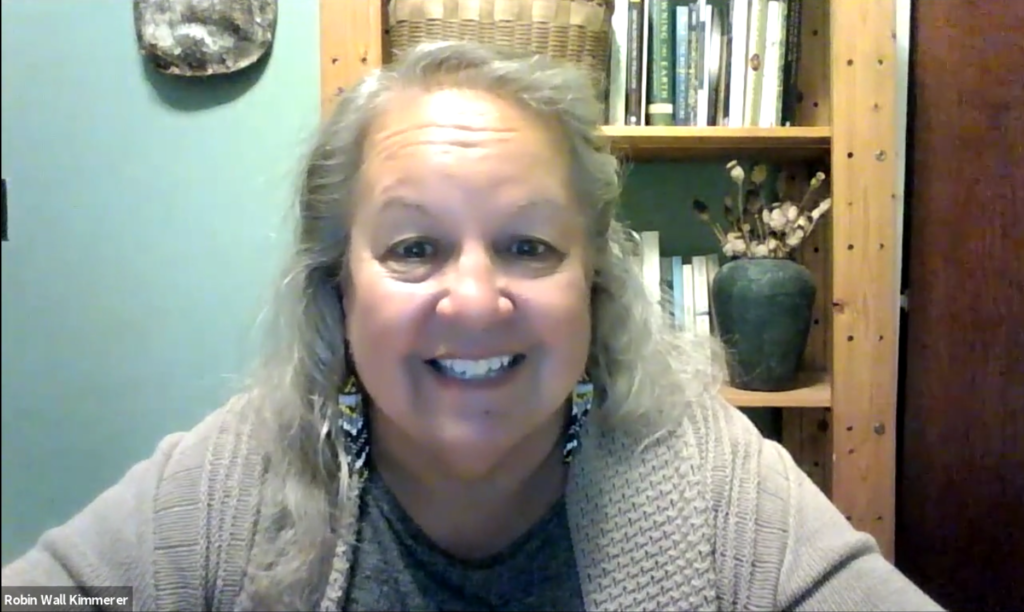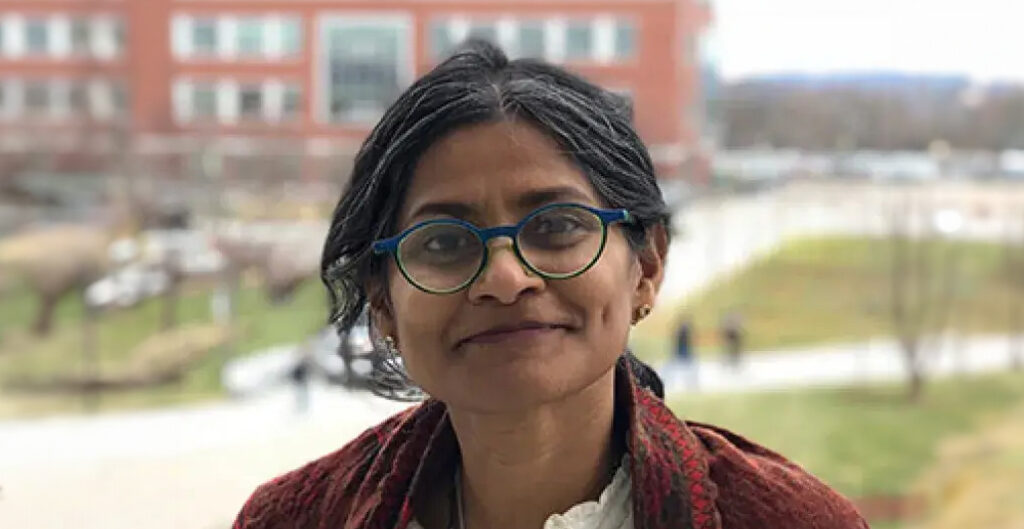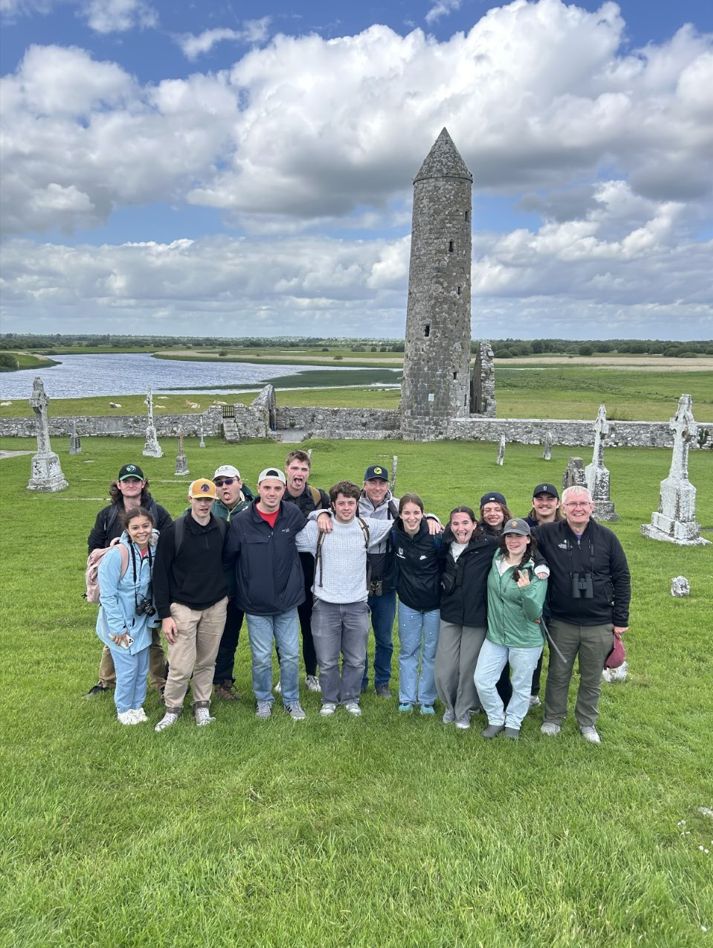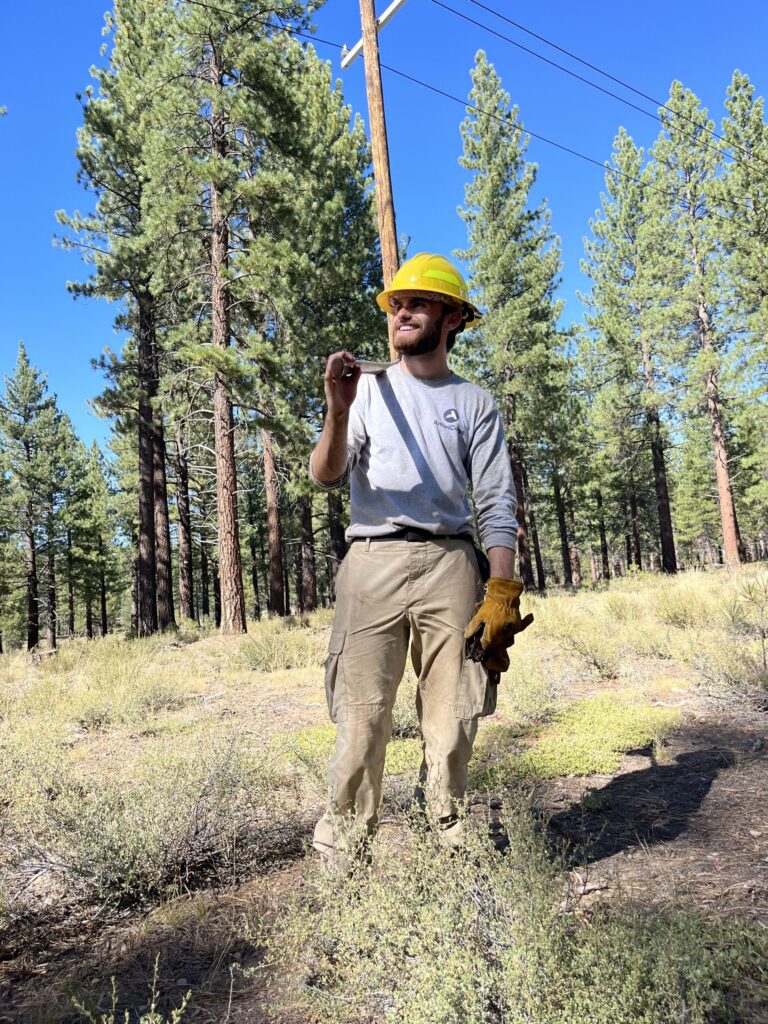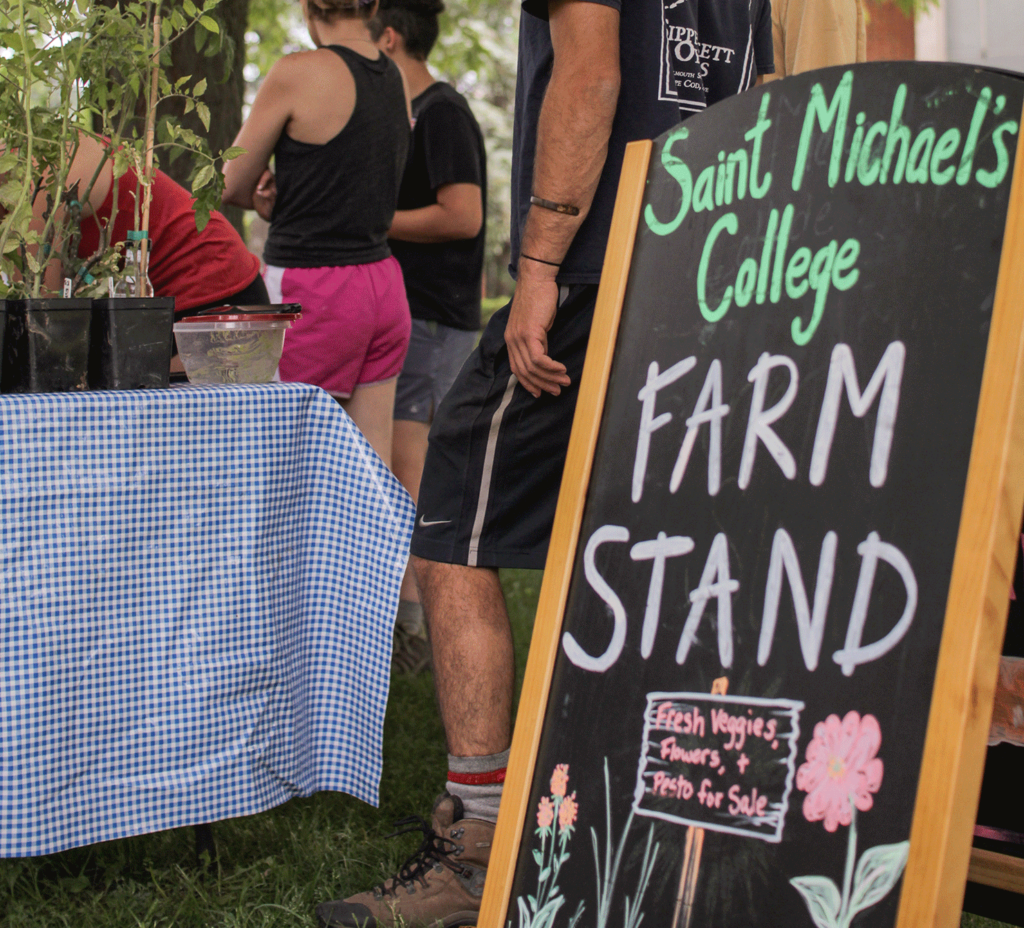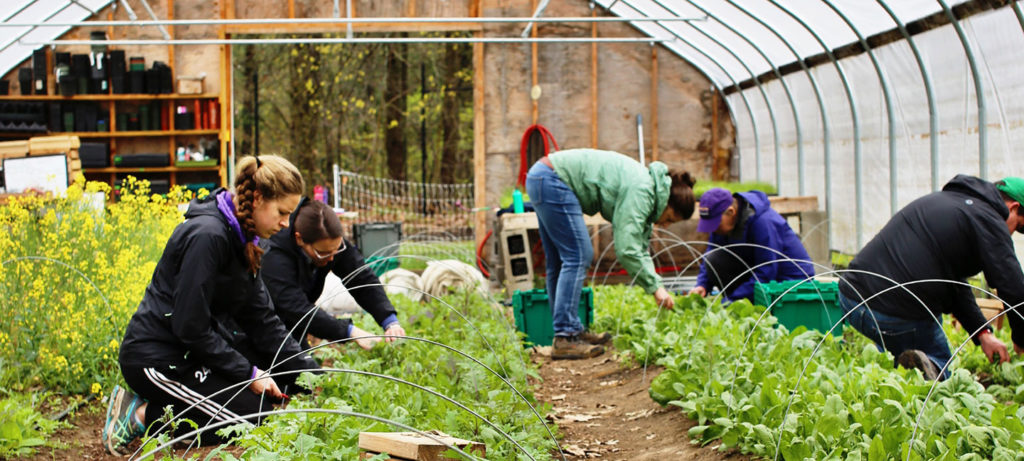Nearly 300 in hybrid audience interact with First-Year Seminar Common Text author Robin Kimmerer
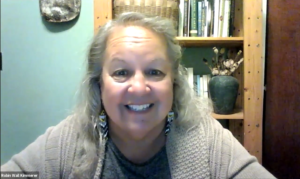
Author Robin Kimmerer speaks to Saint Michael’s students in real time online Monday evening in this screen-shot from the event.
The fall semester Saint Michael’s College First-Year Seminar event, based on this year’s Common Text – Robin Wall Kimmerer’s “ Braiding Sweetgrass: Indigenous Wisdom, Scientific Knowledge, and the Teachings of Plants – took place in a hybrid format – both as an in-person event in the McCarthy Recital Hall on campus and online as a Zoom Webinar.
Approximately 50 students, staff, and faculty participated in person with approximately 250 virtual participants. Kimmerer interacted live in real time with the assembly and was on a big screen in the Recital Hall.
Click here to see a video of the webinar
About author Robin Wall Kimmerer
Robin Wall Kimmerer is a member of the Citizen Potawatomi Nation and an indigenous scientist. She is a botanist who holds a position as a Distinguished Teaching Professor at the SUNY College of Environmental Science and Forestry in Syracuse, New York. She is the founding Director of the Center for Native Peoples and the Environment; the co-founder and past president of the Traditional Ecological Knowledge section of the Ecological Society of America; and a Senior Fellow at the Center for Nature and Humans.

A slide from Monday’s presentation illustrating cultural aspects of the Potawatomi Nations of which Robin Kimmerer is a part.
Kimmerer’s research interests include the ecology of mosses and the role of traditional ecological knowledge in ecological restoration. She collaborates with tribal partners in the research she pursues with her students and is active in efforts to broaden access to environmental science education for Native students. Dr. Kimmerer also works to create new models for integration of indigenous philosophy and scientific tools on behalf of land and culture. She is engaged in programs that introduce the benefits of traditional ecological knowledge to the scientific community in a way that respects and protects indigenous knowledge.
As a writer and a scientist, her interests in restoration include not only restoration of ecological communities, but also restoration of our relationships to the land. Dr. Kimmerer is the author of numerous scientific papers, while also being active in literary biology, with essays published in Whole Terrain, Adirondack Life, Orion, and several anthologies. Her book Gathering Moss: A Natural and Cultural History of Mosses (2003) earned the John Burroughs Medal for Nature Writing in 2005. Braiding Sweetgrass: Indigenous Wisdom, Scientific Knowledge and the Teachings of Plants (2013), her most recent book, received the Sigurd Olson Nature Writing Award. In 2015, she addressed the general assembly of the United Nations on the topic of “Healing Our Relationship with Nature.” She lives on an old farm in upstate New York, tending gardens both cultivated and wild. — Biographical information borrowed and adapted from the author’s website: https://www.robinwallkimmerer.com/about
Creative inquiry
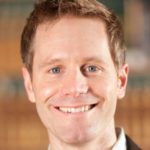
Peter Vantine
In the chapter “Asters and Goldenrods” from Braiding Sweetgrass, the author describes a discouraging initial experience as a new first-year college student. An adviser’s condescension and limited view of what constituted a particular field of study — what counted as science — squelched her curiosity and separated different ways of seeing the world into narrow silos, instead of inviting her to pursue creative inquiry and seek to better understand the complex connections between various facets of our world. Here at Saint Michael’s, we’ve instead offered new students Kimmerer’s more open, encouraging, respectful, and courageous approach to both intellectual inquiry and hands on learning.
The First-Year Seminar program is pleased to have been able to provide students with this unique opportunity to speak with the author herself. We are deeply grateful to Dr. Kimmerer for sharing with us the gift of her time. She connected with us remotely, virtually. Yet her presence with us was anything but distant or merely virtual. It allowed us to hear the warmth of her voice and the intonation with which she imbues her words, to see the expressivity with which she shares her wisdom, and, crucially, the chance to ask her questions directly.
What does the Earth ask of us?
In line with a central theme of her book, Kimmerer began by expressing her gratitude—for the invitation to speak with the Saint Michael’s College community, for the day itself, and for all the blessings in her life. She introduced herself and gave thanks in Potawatomi, allowing the audience an opportunity to hear the beautiful musicality of the language. The author also reminded the audience of the indigenous communities on whose land we stand, both in Syracuse, New York, where she lives and teaches, and in the Lake Champlain region of Vermont. Her talk was then guided by the question “What does the Earth ask of us?”
As she does throughout her book, she spoke eloquently about the need to braid together the insights of Western science and indigenous wisdom, to bring both perspectives to bear on our understanding of and interaction with the world. We must “learn to see with both eyes,” she explained. She articulated the disastrous ecological consequences of the “dominant materialist world view” that conceives of land as capital, as a “source of belongings,” rather than as a “source of belonging.” In contrast to this paradigm, the described the indigenous conception of land as ancestral connection, identity, and home—for both humans and the plants, animals, and other beings that are our “non-human relatives”; land as sustainer, healer, and source of knowledge; and, ultimately, land as a sacred entity that entails a moral responsibility. These ideas are reflected in the practices and values that form the largely unwritten but enduring indigenous protocols of the Honorable Harvest.
Kimmerer evoked the need for an imaginative, multifaceted approach to correcting environmental devastation and finding sustainable solutions to the ecological challenges humanity faces. The efforts, she argued, should include socially and environmentally just and respectful policies, restorative practices, regenerative economies, and both the arts and science. She emphasized the importance of education, stating that an educated person is one who “knows their own gifts and how to give them to the world”.
In Braiding Sweetgrass, Kimmerer describes writing as “an act of reciprocity with the world,” what she can “give back in return for everything that has been given” to her. By reading, discussing, and reflecting on her work in their First-Year Seminars, the students of Saint Michael’s were giving it their thoughtful attention and entering into that reciprocal relationship between the author, her readers, and the world. Monday night’s event further extended that reciprocity by affording an opportunity for the author and several hundred of her readers to listen to and dialogue with one another.
Connections across campus
Kristyn Achilich ’05, director of the The Institute for the Environment at Saint Michael’s College, attended Monday’s event virtually and reflected after on the deep relevance of the conversation to the Center and its work.
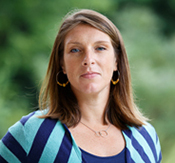
Kristyn Achilich ’05
“The Institute for the Environment’s mission is to develop environmentally conscious citizens as leaders, advocates, scientists, artists, humanitarians, thinkers & business people. This consciousness calls us to not only cultivate skills and knowledge in a particular field of study or acquire an accomplished resume, but also to live in community with this place we call Saint Michael’s and each other,” said Achilich. “Kimmerer’s text and her talk this week echoed this consciousness, belonging, and intentionality.”
As the Center grows into itself, she said, “this ethos both on campus and with our community partners is our driving force. I called us to this community earlier this fall in my newsletter to campus outlining how we facilitate these relationships through our outdoor classrooms and programs. Kimmerer’s Honorable Harvest is truly a message larger than that of a set of guidelines for removing gifts of the land, but a gift to us to guide a relationship with each other and the land and places we inhabit.”
“This week alone, I spoke of Kimmerer’s guidance for stewardship with four sections of Biology 151, adding more than just the practical skills to a lab on nutrient analysis, but the intentionality and depth a farmer must have to ensure the health of their soils. Kimmerer’s guidance also accompanied students in ESS 225: Food Systems & Sustainable Agriculture on a field trip to The Farm at the Vermont Youth Conservation Corps, where while discussing minimal soil disturbance and generational stewardship, another of her quotes — ‘The land is the real leader. All we need as students ins mindfulness’ — called us to check the technicality of what we learn and need to do against what is truly needed, encouraging us to use our thinking minds and not just prescribed ideas and tools.”

Another screen shot from the presentation getting at a key point from the speaker and her book.

For all press inquiries contact Elizabeth Murray, Associate Director of Communications at Saint Michael's College.
